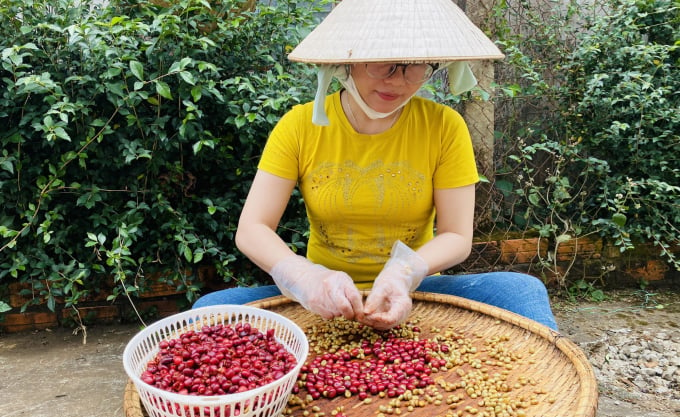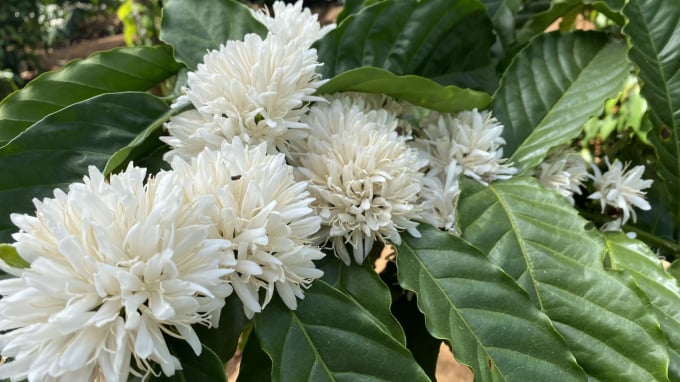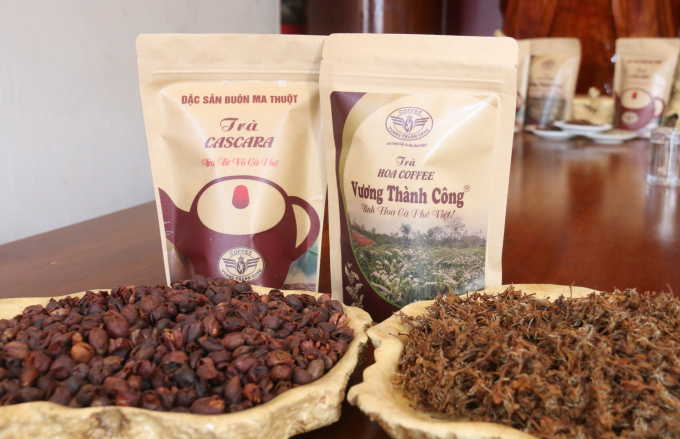October 28, 2025 | 14:14 GMT +7
October 28, 2025 | 14:14 GMT +7
Hotline: 0913.378.918
October 28, 2025 | 14:14 GMT +7
Hotline: 0913.378.918
The Central Highlands has over 640,000 ha of coffee, accounting for over 92% of the country's area. The harvested output is 1.67 million tons, accounting for about 95% of the country's coffee output. This place is also home to 87 coffee processing establishments, accounting for 36.4% of the whole country.
It can be affirmed that coffee is the main crop of farmers in the Central Highlands. But in the past people only harvested coffee beans. The flowers and husks were discarded or partially used as manure. Many companies and cooperatives have recently researched and learned to make use of coffee flowers and husks to make tea. This is one of the new products that can help people and businesses increase their profits.
As one of the pioneers in this new path, Mr. Le Van Vuong, Director of Vuong Thanh Cong Trading and Production Company (Buon Ma Thuot city, Dak Lak province) said that this tea product possessed great economic potential.

Ripe coffee berries are selected and peeled to make tea. Photo: Quang Yen.
The process of processing fresh coffee pods from harvest to finished product is an extremely meticulous process. The coffee cherries must be picked entirely by hand. Only the ripest red cherries are selected. The cherries are then washed and manually peeled so that the pods are not crushed, followed by a quick process to prevent spoilage due to fermentation.
The company has also studied the method of making tea from coffee flowers and put it into production in 2021. Normally after harvesting, people would cut the coffee branches, but the company leaves these branches intact to nurture the flowers. When the flowers are in full bloom, the branches will be cut to harvest them.
“Coffee flowers are harvested from 4 a.m. to 8 a.m. daily. At this time, the dew still remains on the petals so the flowers are fresh, which means quality. The company's two products are manufactured and purchased from households with organic coffee gardens to ensure that the products do not have any pesticide residues," said Mr. Vuong.
Every year, Vuong Thanh Cong Company produces more than 500 kg of tea. The market price is high, in which coffee husk tea costs VND 1.3 million/kg, and coffee flower tea from coffee flowers costs VND 5 million/kg. The company's tea products are currently sold on most e-commerce platforms and supermarkets. Ho Chi Minh city, Hanoi and Dak Lak are three major consumption areas.

In the past, coffee flowers were left to fall, but now they are used to make tea. Photo: Quang Yen.
“Of course, without making tea from pods and flowers, people still have their main income from coffee beans. But if people can produce more tea from the husks and flowers, their source of income can be 4 to 10 times higher. With each ha of coffee farmers can earn approximately VND 100 million. Making tea can help them increase their income up to VND 400-500 million/ha,” said Mr. Vuong.
Also one of the units to experiment with making tea from coffee husks and flowers, Mr. Tran Dinh Trong, Director of Ea Tu Fair Cooperative (Buon Ma Thuot city, Dak Lak), said the economic potential of the products was indeed massive. However, the problem lies in output.
The cooperative experimented with making tea from coffee husks and flowers two years ago. The unit could however only produce a few tens of kilograms because the output is still limited.

The two tea products made from coffee husks and flowers possess great economic potential but output is still limited at present. Photo: Quang Yen.
The cooperative chose to make the products from gardens that did not use chemical fertilizers and drugs, so the health issue was guaranteed. They even received good feedback from customers as the coffee husk tea’s honey-like sweet flavor suited their taste well.
“The potential is great but the output is limited. The cooperative hopes that there will be an associated business so that the unit can produce in large quantities because the raw materials from flowers and coffee husks are abundant. This is a new direction for coffee-related products in the Central Highlands”, Mr. Trong said.
Translated by Samuel Pham

(VAN) The Integrated Plant Health Management (IPHM) helps farmers in Quang Ngai increase rice production efficiently and sustainably.

(VAN) Developing low-emission cultivation technology packages, MRV system, strengthening multi-stakeholder cooperation are to realize the goal of low-emission crop production.
/2025/10/23/5928-2-194850_964.jpg)
(VAN) The 'Regenerative cocoa production to support livelihood development in Vietnam' (ReCoPro) project marks an important step toward sustainable cocoa production.

(VAN) Reducing antibiotic dependence in livestock production helps protect public health, enhance food safety, and promote sustainable agricultural development.

(VAN) Experts describe Viet Nam as a 'policy laboratory' within ASEAN, where new agroecological, green finance, and risk-management initiatives are being piloted before wider regional adoption.

(VAN) Limiting rice straw burning and reusing agricultural by-products as materials or fertilizers not only improves soil health but also helps clean the air.

(VAN) ASSET delivers long-term vision and strategy, innovative models, learning networks, policy impact, and measurable environmental benefits.